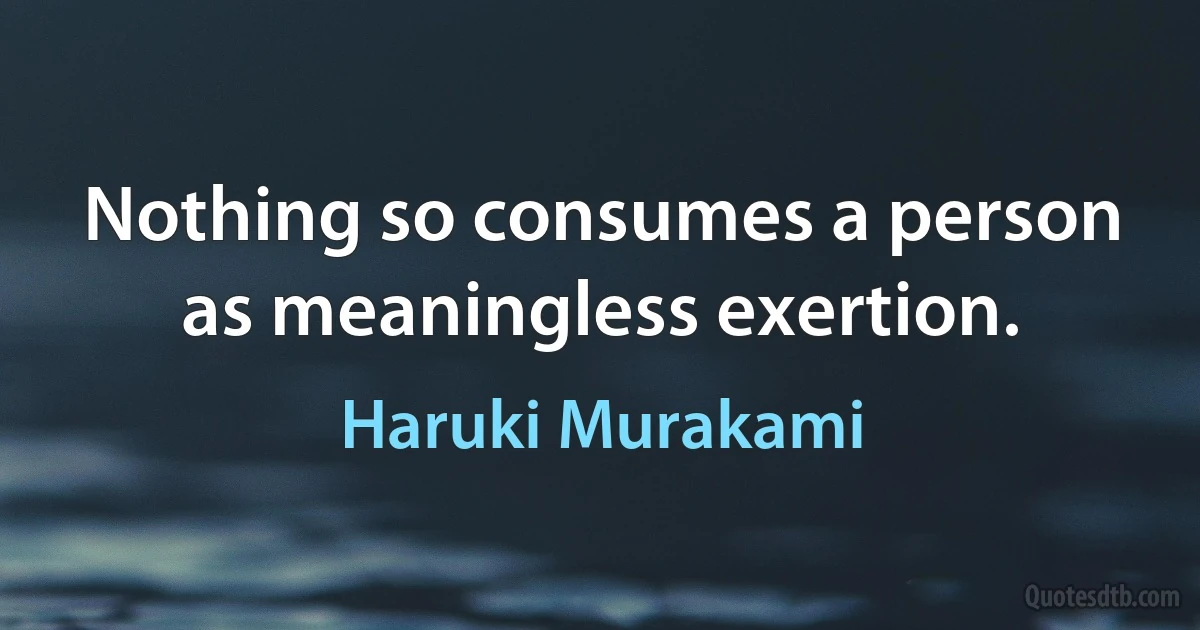Exertion Quotes
Industrial production, the flow of resources in the economy, the exertion of military effort in a war, the management of finances --all require the coordination of interrelated activities. What these complex undertakings share in common is the task of constructing a statement of actions to be performed, their timing and quantity (called a program or schedule), that, if implemented, would move the system from a given initial status as much as possible towards some defined goal.

George Dantzig
Industrial production, the flow of resources in the economy, the exertion of military effort in a war theater-all are complexes of numerous interrelated activities. Differences may exist in the goals to be achieved, the particular processes involved, and the magnitude of effort. Nevertheless, it is possible to abstract the underlying essential similarities in the management of these seemingly disparate systems.

George Dantzig
How melancholy a thing is success. Whilst failure inspirits a man, attainment reads the sad prosy lesson that all our glories "Are shadows, not substantial things." Truly said the sayer, "disappointment is the salt of life" a salutary bitter which strengthens the mind for fresh exertion, and gives a double value to the prize.

Richard Francis Burton
It may not sound very consistent with any such professed humility on my part, if I say to you that, after having served for the Quaternions during fourteen years, and having (as America seems to think) won my Rachel-to be my own by an intellectual marriage-I now wish to wind up several scientific projects, from which those quaternions had for a long time diverted me; and feel as if I were entering, or had already entered, on a new harvest of labour and reputation. As to Fame, if it have not been won or earned already, it is not likely that any future exertion will make it mine.
But as to the Labour; that is a thing within everybody's power to judge of, even for himself. I have very long admired Ptolemy's description of his great astronomical Master, Hipparchus... "a labour-loving and truth-loving man."-Be such my epitaph!

William Rowan Hamilton
Demiurgus [said my father] was enamoured of refined, perfect, and sophisticated materials. We give precedence to junk. We are simply rapt by it, entranced by the cheapness, the paltriness, the tawdriness of the material. Do you understand,” my father asked, "the profound meaning of that weakness, that passion for gaudy tissue-paper, papier-mâ ché, coloured lacquer, straw, and sawdust? It is,” he said with a pained smile, "our love for matter as such, for its downiness and porousness, its unique, mystical consistency. Demiurgus, that renowned master and artist, hides it away, causes it to vanish behind life's make-believe. We, to the contrary, love its abrasiveness, its unruliness, its rag doll ungainliness. Behind each gesture, each movement, we like to see its exertion, its torpor, its sweet ursinality.

Bruno Schulz
Do they find in the history of St. Domingo, and in the present condition of Jamaica, under the recent experiments which have been made upon the institution of slavery in the liberation of the blacks, before God, in his wisdom, designed it should be done - do they there find anything to stimulate them to future exertion in the cause of abolition? Or should they not find there satisfactory evidence that their past course was founded in error?

Jefferson Davis
Were we required to characterise this age of ours by any single epithet, we should be tempted to call it, not an Heroical, Devotional, Philosophical, or Moral Age, but, above all others, the Mechanical Age. It is the Age of Machinery, in every outward and inward sense of that word; the age which, with its whole undivided might, forwards, teaches and practises the great art of adapting means to ends. Nothing is now done directly, or by hand; all is by rule and calculated contrivance. For the simplest operation, some helps and accompaniments, some cunning abbreviating process is in readiness. Our old modes of exertion are all discredited, and thrown aside. On every hand, the living artisan is driven from his workshop, to make room for a speedier, inanimate one. The shuttle drops from the fingers of the weaver, and falls into iron fingers that ply it faster.

Thomas Carlyle



